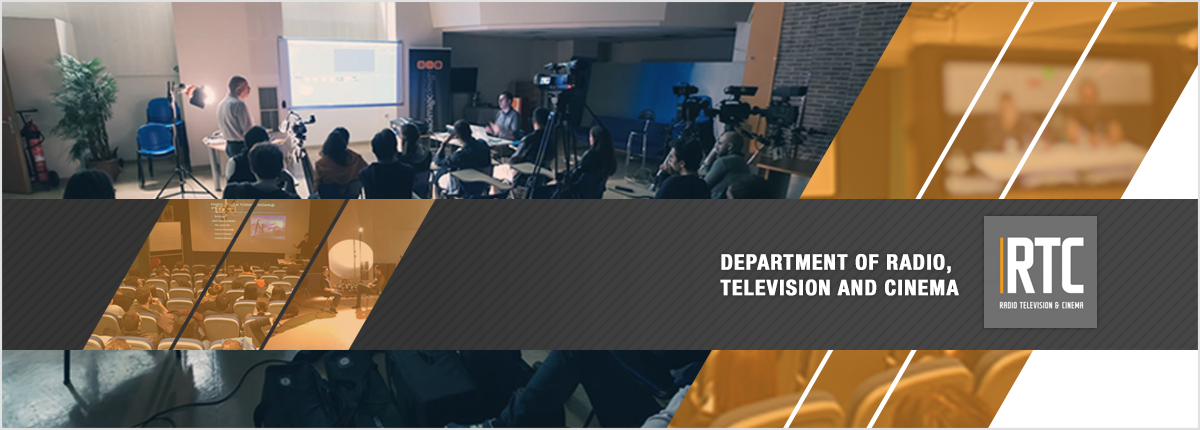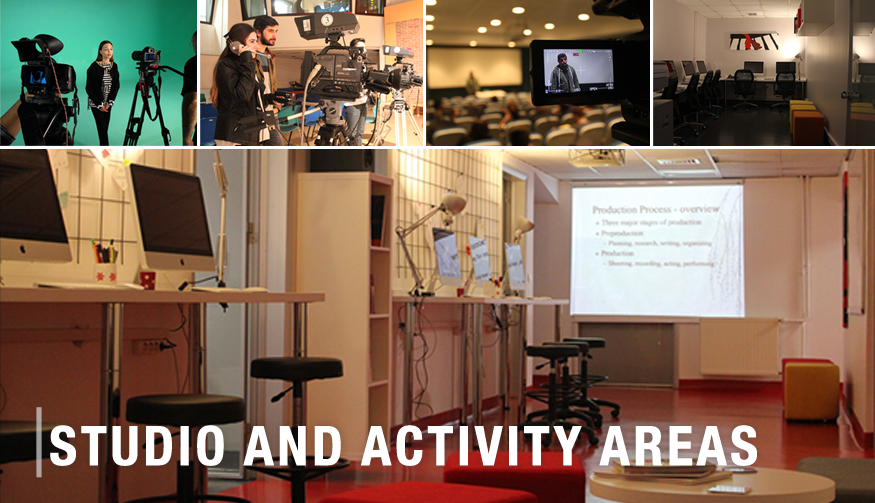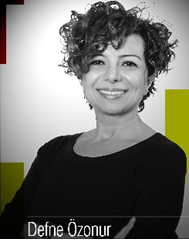
Our main objective is to train our students as young and dynamic communicators for the competitive environment of radio, television and cinema in the 21st century. In line with this objective, we follow a curriculum that enables our students to develop their individual talents as well as to use these individual talents in teamwork due to the specificity of their field of study. In this context, in addition to the basic theoretical courses in our department, there are minor and double majors within or outside the faculty, practical courses carried out in our studios and agencies, field internships and graduation projects that prepare our students to work in the field.

Program Goals
Program Learning Outcomes

You can find our studios, activity areas and classrooms following the links below.
Thanks to the technology that develops day by day, distances become closer. With this technological breakthrough, the need for the radio, television and cinema sector increases day by day. The rapid expansion of mass media penetration areas causes the need for professional personnel to work in the radio, television and cinema sector. This need has led to the opening of departments that provide education in this context in universities. Students studying in the department of radio, television and cinema should be able to use communication and communication tools effectively and follow the necessary planning and technological developments closely in this context. The aim of Yeditepe University Radio, Television and Cinema department is to train qualified individuals who will serve the society in this context. Young people who have high communication skills, feel socially competent and want to receive education in this context can choose this department. In today's world, where the importance of the media sector is increasing day by day, the need for these communication tools seems to continue to increase.
| University Name | Score Type | General Quota | Base Score | Ranking |
| YEDİTEPE UNIVERSITY | SÖZ - Scholarship | 8 | 455,49173 | 1305 |
| YEDİTEPE UNIVERSITY | SÖZ - 50% Scholarship | 65 | 236,49332 | 722690 |
| YEDİTEPE UNIVERSITY | SÖZ - No Scholarship | 8 | Not full | Not full |
You can visit this page for Yeditepe University Department of Radio, Television and Cinema 2023 - 2024 academic year tuition fees and payment plan and other curiosities.
Yeditepe University provides scholarship opportunities to its students in different fields. You can find detailed information about scholarship opportunities by examining the Radio, Television and Cinema Scholarship Opportunities page. You can access the relevant page here and get information about scholarship opportunities.
Radio, television and cinema are among the leading mass media of the current century as well as the last century. The aim of this department is not only to follow contemporary developments, but also to train individuals who can assume different roles in the professional and social fields of communication and cinema. Yeditepe University Department of Radio, Television and Cinema offers a curriculum in which theory and practice balance each other. The series of seminars that have been held for years under the title of "current issues" in the media is a product of this department. Within the scope of the activities organized through these seminars, students are brought together with invited guests by taking into account the demands of the students. In this way, students have the opportunity to meet and exchange information with the leading names of the sector. The language of instruction is English as in other departments. However, students can also learn a second foreign language if they wish.
In addition to its own faculty members, the Department of Radio, Television and Cinema also includes expert lecturers from the sector, especially in applied courses. In this way, it is possible for students to access current and hot information directly and quickly. At the same time, students are provided with the opportunity to follow the rapid developments in the field of communication. The Department of Radio, Television and Cinema is in direct contact with the leading organizations of the sector. In this context, the opportunities for students to do internships in these organizations and find a job after graduation are one of the selection criteria to be considered when choosing Yeditepe University Department of Radio, Television and Cinema.
Yeditepe University is an institution with a brand value that can be considered one of the leading institutions in the education sector. In this context, getting a Yeditepe University diploma is a significant advantage, especially when evaluating private sector job opportunities. In addition, when the ranking list of Radio, Television and Cinema Departments in Turkey is examined, it is seen that Yeditepe University Radio, Television and Cinema Department has an extremely high ranking.
Our students studying in the Department of Radio, Television and Cinema gain the skills of taking responsibility, effective participation, coordination and planning skills required by a harmonious and efficient teamwork throughout their education life. In addition, by synthesizing the latest knowledge and skills in their fields of expertise, they acquire the ability to produce in accordance with professional standards in various narrative forms and genres specific to their fields.
Graduates of the Department of Radio, Television and Cinema have the professional knowledge to work in different fields of radio, television and cinema sectors such as copywriting, cinematography, editing, sound design, production and management, media management at home and abroad and design original projects by following new technologies, developments and ideas.
Graduates of the Department of Radio, Television and Cinema who have these skills can find a wide range of jobs in press organizations, broadcasting organizations, advertising agencies, television channels, news agencies, radio channels, content production agencies and newspapers. Apart from these, in the public and private sector, publicity departments, media promotion responsibility, press consultancy, etc. can take duties. Graduates of the department who aim for an academic career can work as faculty members in the relevant departments of universities and can conduct scientific research and production.
Mission
Our mission is to be a department that educates our students as contemporary and dynamic communicators who have the ability to apply the knowledge they have acquired with international quality education to the competitive environment in the fields of radio, television and cinema in the 21st century.
Vision
Our department, in the light of theoretical and practical up-to-date knowledge in the fields of radio, television and cinema, educates communicators who are modern, open to international competition, questioning, researching, social responsibility and ethical awareness, ready to assume effective roles in professional and social fields.
Core Values
Contemporary science and education carried out with the belief of service to society based on Atatürk's Principles and the Republican Renaissance.
Our faculty, which has bilateral agreements with many higher education institutions abroad, attaches great importance to student mobility. For this reason, the Department of Radio, Television and Cinema welcomes many students from universities all over the world and sends students to these universities every semester within the scope of Erasmus and exchange programmes. Within the scope of these agreements, the current list of universities where students of the Department of Radio, Television and Cinema can complete a part of their education is given below.
University, Country, City and Quota Information
Click here to access the Erasmus flow chart.
At Yeditepe University, all student exchange processes are followed by the International Office (click to access) and each department within the university has an Erasmus Coordinator. The Erasmus Coordinator of our department is Prof. Dr Defne Özonur, whose details are given below. Our department's Erasmus Coordinator, who is in constant contact with the International Office, is in contact with students at all stages before, during and after the application process.

Erasmus Coordinator of Department
Prof. Dr Defne Özonur
Telephone: 0216 578 00 00 / 3083
E-mail: defne.ozonur@yeditepe.edu.tr
Office: Fine Arts Building, 631
Higher education departments in Europe, which are compatible with each other, aim to strengthen their communication capabilities within the scope of the Bologna Process and to eliminate the differences that occur during implementation. The main purpose of this process is to strengthen the communication between faculty members and students. Students of the Department of Radio, Television and Cinema continue their education and training activities as more conscious and equipped thanks to the Bologna Process. Click here to see the Program Information Package.
In addition to their main undergraduate programs, our university offers undergraduate students the opportunity to receive a second undergraduate diploma as a student in a different program within the university (double major) or to study in a minor program to enable them to gain knowledge in a specific field. Students who have achieved the right to graduate from the main undergraduate program in which they are enrolled and who complete the double major program are awarded a second major undergraduate diploma, and students who complete the minor program are awarded a minor certificate. Students who fulfill the necessary conditions can apply to the relevant department secretariat at the beginning of the third semester at the earliest and the fifth semester at the latest, and those who want to do a minor at the beginning of the third semester at the earliest and the sixth semester at the latest.
In order to start the Double Major and Minor programs, a learning protocol must be signed between the relevant departments, including the additional courses, equivalent courses and common courses that the student must take, and this protocol must be accepted by the senate of our university. Students who are eligible for Double Major (DMP) and Minor Basic Principles and Rules* start the process specified below by applying to the relevant department secretariat after the application dates are announced on the university website;
* In order to apply for double major programs, the student must have a GPA of at least 2.75 out of 4 and must have a placement score not less than the base score of the double major program in the relevant year. In order to be able to study double major with a scholarship, a GPA of 3.25 out of 4 is required.
* In order to apply for minor programs, the student must have a GPA of at least 2.5 out of 4. In order to be able to study the minor program with a scholarship, a GPA of 3 out of 4 is required.
A student may drop out of the Minor or Minor Program voluntarily or under the conditions stipulated in the undergraduate regulations. If the student leaves the DMP or minor program, he/she does not have to repeat the courses in the failed DMP or minor program. More detailed information on the implementation of the Minor and Minor programs can be found in the Yeditepe University Associate and Undergraduate Education Regulations (Chapter 4, page 5) published on our university website.
You can find double major and minor programmes here.